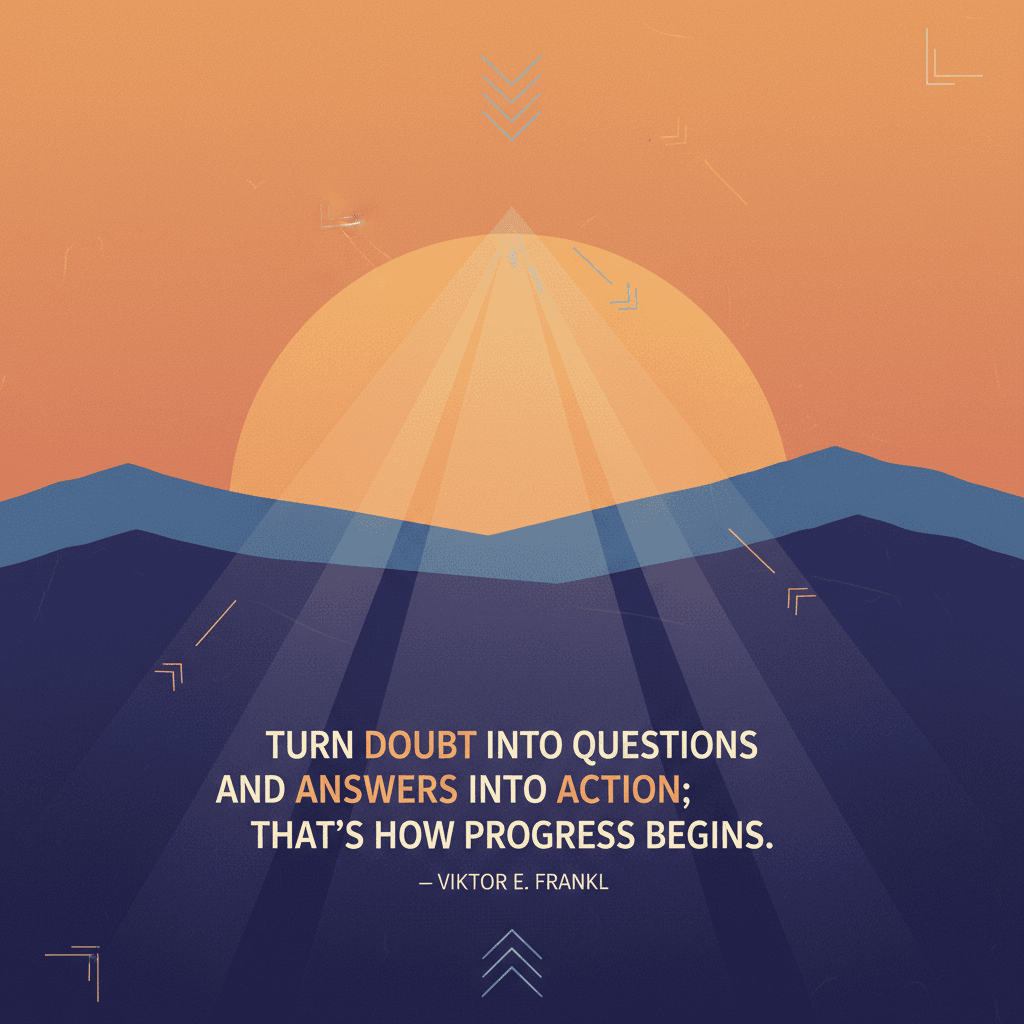From Doubt to Action: Frankl’s Progress Principle

Turn doubt into questions and answers into action; that's how progress begins. — Viktor E. Frankl
—What lingers after this line?
One-minute reflection
What feeling does this quote bring up for you?
Meaning as Momentum
To begin, Viktor E. Frankl, the psychiatrist and Holocaust survivor, argued that meaning is not merely contemplated but pursued through decisive engagement with life. In Man’s Search for Meaning (1946), he frames purpose as a verb: something enacted under constraint, not merely envisioned. His maxim—turn doubt into questions and answers into action—maps a pragmatic arc from uncertainty to momentum. Doubt, in this view, is not paralysis; it is raw material. When shaped into questions, it yields answers; when answers are tested in the world, progress begins. Thus Frankl recasts existential confusion as an invitation to move.
Doubt Reframed as Intelligent Inquiry
Building on this, doubt matures when it becomes disciplined questioning. Socrates transformed uncertainty into rigorous dialogue, as Plato’s Apology (c. 399 BC) shows, surfacing contradictions to clarify truth. Later, Francis Bacon’s Novum Organum (1620) translated skepticism into method, urging experiments over speculation; similarly, Descartes’ Meditations (1641) used methodic doubt to anchor reliable knowledge. The thread is consistent: well-formed questions convert vague unease into tractable problems. By defining terms, isolating variables, and seeking disconfirming evidence, we upgrade doubt into a searchlight rather than a fog. With better questions in hand, we are poised to evaluate answers rather than cling to assumptions.
From Answers to Experiments
From there, answers should not harden into dogma; they begin as hypotheses. Action validates them. Practical frameworks turn insight into movement: John Boyd’s OODA loop (observe–orient–decide–act, 1970s) stresses rapid cycles; W. Edwards Deming’s PDCA (plan–do–check–act) embeds learning into operations; design thinking prototypes and the Lean Startup build–measure–learn loop (Eric Ries, 2011) test value with minimal risk. Each model treats action as inquiry by other means. Rather than waiting for perfect certainty, we run small, reversible experiments that generate fresh evidence. In this way, acting is not the opposite of thinking; it is thinking continued in the world.
Psychology That Bridges Knowing and Doing
Moreover, the science of behavior helps us cross the intention–action gap. Peter Gollwitzer’s implementation intentions (1999) show that if–then plans—“If it is 8 a.m., then I will email three users”—dramatically increase follow-through. Gabriele Oettingen’s WOOP method aligns wishes with realistic obstacles to trigger contingency plans. Albert Bandura’s self-efficacy (1977) research explains why small wins compound confidence, while Carol Dweck’s growth mindset (2006) reframes setbacks as data. Together they convert answers into routines: clear cues, modest stakes, and rapid feedback. Thus psychology supplies the gears that carry inquiry forward when motivation alone fades.
Historical Proof of the Cycle
Looking to history, progress reliably follows this sequence. Florence Nightingale questioned why soldiers died more from disease than wounds; her coxcomb charts in Notes on Matters Affecting the Health of the British Army (1858) turned data into sanitation reforms that slashed mortality. Likewise, U.S. civil rights leaders asked whether segregation could withstand nonviolent scrutiny; the Montgomery Bus Boycott (1955–56) transformed ethical answers into coordinated actions—marches, carpools, legal challenges—yielding durable change. In both cases, disciplined questions distilled the problem, while iterative actions, informed by evidence and values, shifted institutions rather than opinions alone.
Ethical Direction and Everyday Practice
Finally, Frankl reminds us that action without meaning can be efficient but empty. Logotherapy grounds movement in responsibility—to a task, a person, or a principle—so that progress improves lives, not merely metrics. Practically, a simple cadence sustains the cycle: each week, list doubts; translate them into testable questions; draft one-page hypotheses; run a 24-hour, low-cost experiment; review results and revise. By closing the loop—doubt to question, answer to action—we honor Frankl’s insight and ensure that progress is not an accident but a habit shaped by purpose.